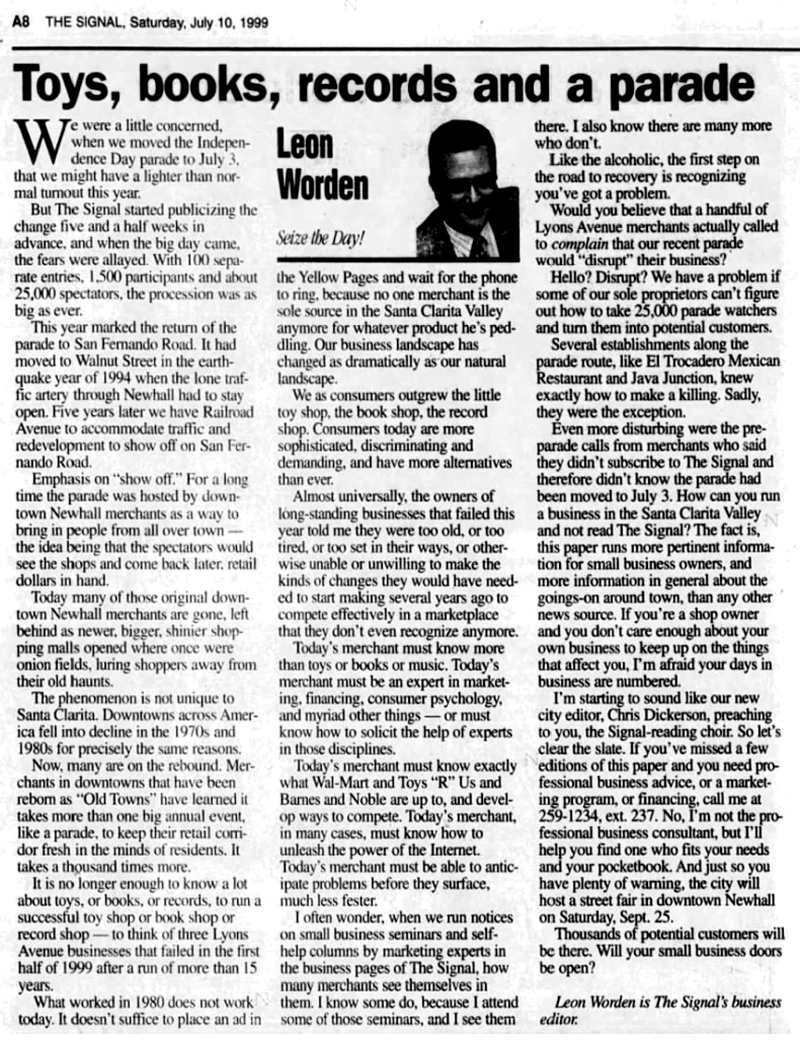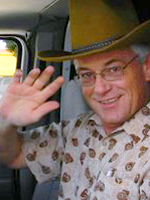Toys, books, records and a parade
Leon Worden • July 10, 1999We were a little concerned, when we moved the Independence Day Parade to July 3, that we might have a lighter than normal turnout this year.
But The Signal started publicizing the change five and a half weeks in advance, and when the big day came, the fears were allayed. With 100 separate entries, 1,500 participants and about 25,000 spectators, the procession was as big as ever.
This year marked the return of the parade to San Fernando Road. It had moved to Walnut Street in the earthquake year of 1994 when the lone traffic artery through Newhall had to stay open. Five years later we have Railroad Avenue to accommodate traffic and redevelopment to show off on San Fernando Road.
Emphasis on "show off." For a long time the parade was hosted by downtown Newhall merchants as a way to bring in people from all over town — the idea being that the spectators would see the shops and come back later, retail dollars in hand.
Today many of those original downtown Newhall merchants are gone, left behind as newer, bigger, shinier shopping malls opened where once were onion fields, luring shoppers away from their old haunts.
The phenomenon is not unique to Santa Clarita. Downtowns across America fell into decline in the 1970s and 1980s for precisely the same reasons.
Now, many are on the rebound. Merchants in downtowns that have been reborn as "Old Towns" have learned it takes more than one big annual event, like a parade, to keep their retail corridor fresh in the minds of residents. It takes a thousand times more.
It is no longer enough to know a lot about toys, or books, or records, to run a successful toy shop or book shop or record shop — to think of three Lyons Avenue businesses that failed in the first half of 1999 after a run of more than 15 years.
What worked in 1980 does not work today. It doesn't suffice to place an ad in the Yellow Pages and wait for the phone to ring, because no one merchant is the sole source in the Santa Clarita Valley anymore for whatever product he's peddling. Our business landscape has changed as dramatically as our natural landscape.
We as consumers outgrew the little toy shop, the book shop, the record shop. Consumers today are more sophisticated, discriminating and demanding, and have more alternatives than ever.
Almost universally, the owners of long-standing businesses that failed this year told me they were too old, or too tired, or too set in their ways, or otherwise unable or unwilling to make the kinds of changes they would have needed to start making several years ago to compete effectively in a marketplace that they don't even recognize anymore.
Today's merchant must know more than toys or books or music. Today's merchant must be an expert in marketing, financing, consumer psychology, and myriad other things — or must know how to solicit the help of experts in those disciplines.
Today's merchant must know exactly what Wal-Mart and Toys "R" Us and Barnes and Noble are up to, and develop ways to compete. Today's merchant. In many cases, must know how to unleash the power of the Internet. Today's merchant must be able to anticipate problems before they surface, much less fester.
I often wonder, when we run notices on small business seminars and self-help columns by marketing experts in the business pages of The Signal, how many merchants see themselves in them. I know some do, because I attend some of those seminars, and I see them there. I also know there are many more who don't.
Like the alcoholic, the first step on the road to recovery is recognizing you've got a problem.
Would you believe that a handful of Lyons Avenue merchants actually called to complain that our recent parade would "disrupt" their business?
Hello? Disrupt? We have a problem if some of our sole proprietors can't figure out how to take 25,000 parade watchers and turn them into potential customers.
Several establishments along the parade route, like El Trocadero Mexican Restaurant and Java Junction, knew exactly how to make a killing. Sadly, they were the exception.
Even more disturbing were the pre-parade calls from merchants who said they didn't subscribe to The Signal and therefore didn't know the parade had been moved to July 3. How can you run a business in the Santa Clarita Valley and not read The Signal? The fact is, this paper runs more pertinent information for small business owners, and more information in general about the goings-on around town, than any other news source. If you're a shop owner and you don't care enough about your own business to keep up on the things that affect you. I'm afraid your days in business are numbered.
I'm starting to sound like our new city editor, Chris Dickerson, preaching to you, the Signal-reading choir. So, let's clean the slate. If you've missed a few editions of this paper and you need professional business advice, or a marketing program, or financing, call me at 259-1234. ext. 237. No, I'm not the professional business consultant, but I'll help you find one who fits your needs and your pocketbook. And just so you have plenty of warning, the city will host a street fair in downtown Newhall on Saturday, Sept. 25.
Thousands of potential customers will be there. Will your small business doors be open?
Leon Worden is The Signal's business editor.

©1999 LEON WORDEN — ALL RIGHTS RESERVED

